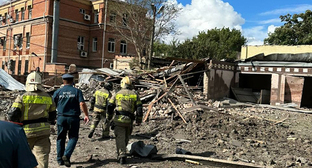
31 July 2023, 23:13
Week in the Caucasus: review of main events of July 24-30, 2023
Explosions in Rostov Region, Ingush activists’ case, persecution of pacifists and activists in Southern Russia, blockade of Nagorno-Karabakh, persecution of opposition in Azerbaijan, and official data on the natives of Southern Russia who perished in Ukraine, – see the review of these and other events in the Caucasus during the week of July 24-30, 2023, prepared by the “Caucasian Knot”.
Explosions in Rostov Region
An explosion occurred in the centre of Taganrog. As a result, the help of doctors was sought by 22 victims, including a child who got bruises when falling from a bicycle. Nine victims applied for a “one-time benefit in case of loss of health as a result of an emergency.”
On July 28, an explosion occurred in the centre of Taganrog. The main blow fell on the territory of the Taganrog Art Museum. The explosion was caused by fragments of a missile launched from the Ukrainian side and shot down by Russian militaries, the Russian Ministry of Defence (MoD) reports. “The wall of the museum and its roof, garages and outbuildings were damaged. The frames in the windows and balconies of a neighbouring three-storey building were broken out,” reported Vasily Golubev, Governor of the Rostov Region.
On the same day, the Russian air defence systems shot down a missile in the Azov Region, the Governor of the Rostov Region reported. According to the Russian MoD’s report, the explosion occurred in a deserted place. On the night of July 27, a missile fell and exploded in the Tatsinsky District of the Rostov Region. The shell crashed near the Zazersky farm yard. The fall of the missile caused a fire. And on July 30, a drone fell in the Daraganovka farm yard not far from Taganrog. As a result, the roof of a private house and a car were damaged.
Ingush activists’ case
In the Stavropol Territory, the court of appeal upheld the verdict to seven protest leaders in Magas sentenced in a case on creating an extremist community. The court upheld the terms of imprisonment for the Ingush activists, but toughened the conditions for additional punishment, advocates of the defendants pointed out. The decision of the court was expected, members of the Ingush Council of Teips stated.
Since January 13, in the Stavropol Territory, a court has been considering complaints filed against the verdict. A public prosecutor called the verdict justified and ignored all the questions of the defendants. The Ingush activists and their defenders pointed out that the court did not take into account many facts testifying that the defendants were not guilty. At the rally in Magas, the activists prevented riots, not provoked them, said Akhmed Barakhoev.
The first instance court issued a verdict based on assumptions, and in the court of appeal, the public prosecutor failed to answer a single question of the defence, noted Malsag Uzhakhov. Responsibility should be borne by the authorities of Ingushetia, who forced people to take to the streets against the redistribution of borders with Chechnya, emphasized Bagaudin Khautiev. The entire Ingush people were being judged in the person of the Ingush activists, stated Zarifa Sautieva. Ismail Nalgiev thanked all human rights defenders and activists for their support. At a court hearing held on July 26, the judge insisted that the activists began to deliver their final speeches in the appeal trial, although all of them asked for time to get prepared for delivering their speeches.
Persecution of pacifists and activists in Southern Russia
A post on the social media became the reason for institution of a criminal case against a resident of Kabardino-Balkaria on discrediting the Russian Armed Forces. A 40-year-old unemployed resident of the Kotelnikovsky District was detained in the case on disseminating the information discrediting the Russian Armed Forces, which he published in his comments, and he also spoke negatively about the country’s authorities. The police detained the man in a residential area, they put him face down on the asphalt while two of them were handcuffing him.
In the city of Volzhsky, a court fined local resident Igor Matlyaev for posting on the social media a video about the situation in Ukraine, which was recognized as discrediting the Russian Armed Forces. The Abinsky District Court recognized comments posted on the social media by local resident Mikhail Sanzhakov as discrediting the Russian Armed Forces and obliged him to pay two fines.
Blockade of Nagorno-Karabakh
At a checkpoint at the entrance to the Lachin Corridor, Azerbaijani border guards detained 68-year-old Vagif Khachatryan, who, among other patients, was transported for medical treatment to Armenia by employees of the International Committee of the Red Cross (ICRC). The General Prosecutor’s Office of Azerbaijan announced that Vagif Khachatryan was wanted on the charge of attacking an Azerbaijani village in 1991. A daughter of Vagif Khachatryan said that he was on his way to Armenia to have a heart surgery and felt unwell during the check of his documents, but the Azerbaijani checkpoint officers took him away to some unknown destination.
On July 26, the government of Armenia sent about 400 tons of food and essential goods to Nagorno-Karabakh, but trucks with humanitarian aid were not allowed through. The Ministry of Foreign Affairs (MFA) of Azerbaijan assessed the Yerevan’s attempt to deliver the cargo to Nagorno-Karabakh without coordination with Baku as an encroachment on the territorial integrity of Azerbaijan. Armenia called the humanitarian situation in Nagorno-Karabakh critical and asked Russian peacekeepers to help deliver humanitarian aid to residents of the unrecognized republic. On July 28, Azerbaijani MPs announced that in order to transport humanitarian aid from Armenia to Nagorno-Karabakh, the trucks should obtain permission from the Azerbaijani border guard service and present the cargo for inspection.
Diplomats from seventeen countries accredited in Armenia and representatives of international organizations visited the Lachin Corridor on July 28. A representative of the Ministry of Foreign Affairs of Armenia expressed the hope that other countries would take steps for unblocking the Lachin Corridor.
On July 26, talks were held in Moscow between the Foreign Ministers of Armenia, Azerbaijan, and Russia, at which Russian Foreign Minister Sergey Lavrov announced the need to deblockade the Lachin Corridor. The Armenian Foreign Minister blamed Baku for the humanitarian crisis in Nagorno-Karabakh, while the Azerbaijani Foreign Minister accused Armenia of political manipulation.
Persecution of opposition in Azerbaijan
On July 24, Vugar Mamedov, the editor-in-chief of the newspaper “Hurriyet”, and Retired Colonel Elnur Mamedov were sentenced to a one-month arrest for disseminating prohibited information. The Committee to Protect Journalists (CPJ) condemned the persecution of journalist Vugar Mamedov for his professional activities and demanded to release him.
On July 26, Elkhan Aliev, an activist of the Popular Front Party of Azerbaijan (PFPA), was detained in Baku. The press service for the Azerbaijani Ministry of Internal Affairs (MIA) reported that Yusif Aliev and Vafadar Akhundov were also detained together with Elkhan Aliev. The court arrested Elkhan Aliev for three months in the case on fraud and forgery of documents. The oppositionist declared the political nature of the persecution.
On July 28, the court prolonged the arrest of Gubad Ibadoglu, the leader of the Azerbaijan Democracy and Prosperity Party, accused of trafficking in counterfeit money. The country’s authorities are promoting in the media the information about the Gubad Ibadoglu’s alleged ties with the FETO organization, recognized in Turkey as terrorist, in order to undermine his authority in the eyes of residents of Azerbaijan, although Gubad Ibadoglu was arrested on trumped-up charges of counterfeiting, human rights defenders noted.
On July 24, Council of Europe (CE) Commissioner for Human Rights Dunja Mijatović sent a letter to Azerbaijani Interior Minister Vilayat Eivazov. In her letter, the CE Commissioner for Human Rights expressed her concern about the recent dispersal of the environmental protests and the arrests of their participants in the village of Soyudlu.
On June 20, the police used special equipment to disperse the protest action of Soyudlu residents who opposed the construction of an artificial water reservoir designed to drain gold mining waste at the “Gadabay” field. The protest actions resulted in arrests and checks.
Official data on natives of Southern Russia perished in Ukraine
By July 30, the authorities and the law enforcement bodies reported about at least 2322 residents of Southern Russia perished in Ukraine, including 1212 residents of the North-Caucasian Federal District (NCFD) and 1110 residents of the Southern Federal District (SFD).
In Dagestan, the authorities reported about 578 local residents perished in Ukraine, in the Volgograd Region – 454, in the Rostov Region – 255, in North Ossetia – 200, in the Krasnodar Territory – 172, in the Astrakhan Region – 170, in Stavropol Territory – 160, in Chechnya – 117, in Kabardino-Balkaria – 97, in Ingushetia – 39, in Adygea – 33, in Kalmykia – 26, and in Karachay-Cherkessia – 21.
This article was originally published on the Russian page of 24/7 Internet agency ‘Caucasian Knot’ on July 31, 2023 at 08:52 am MSK. To access the full text of the article, click here.




